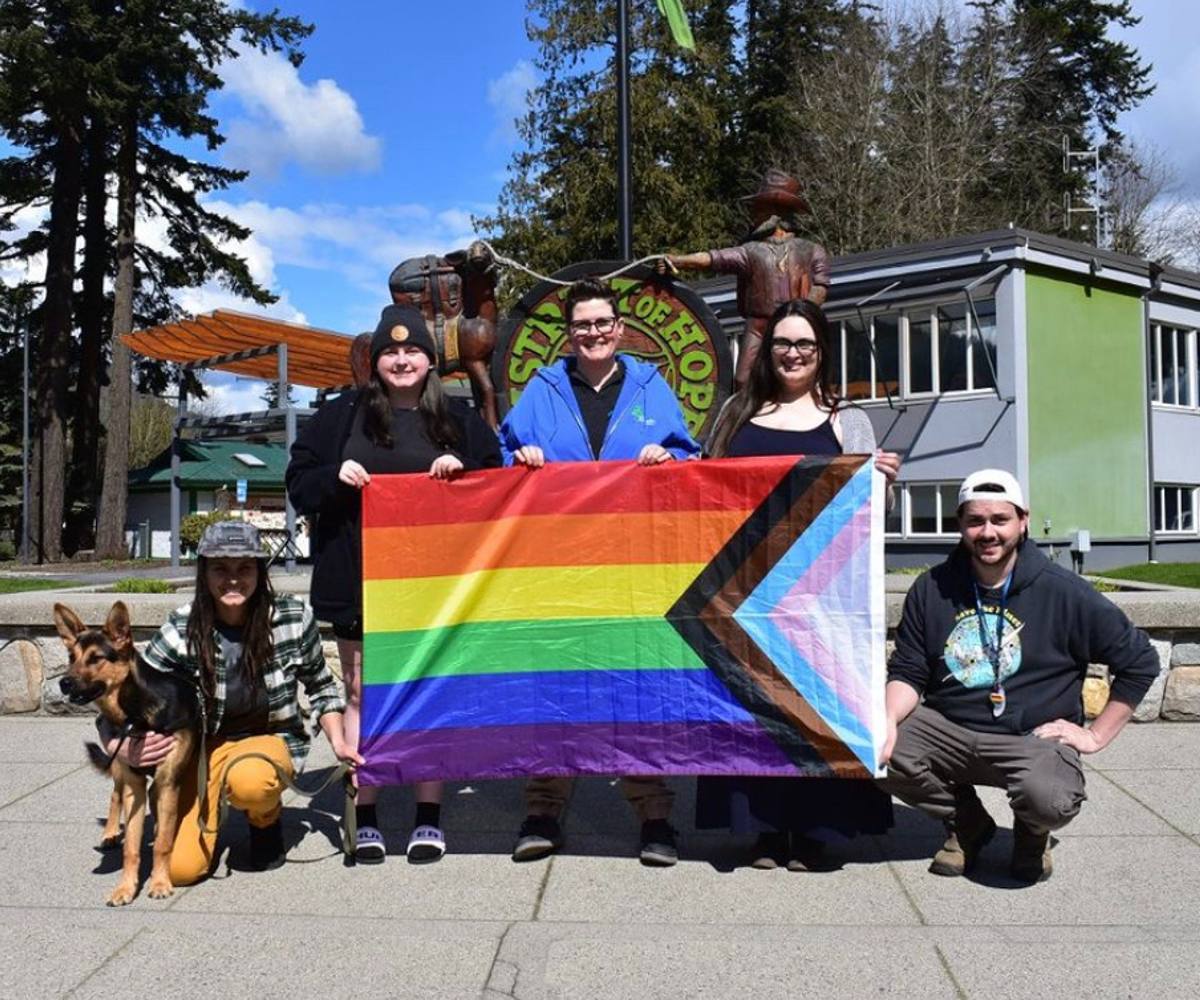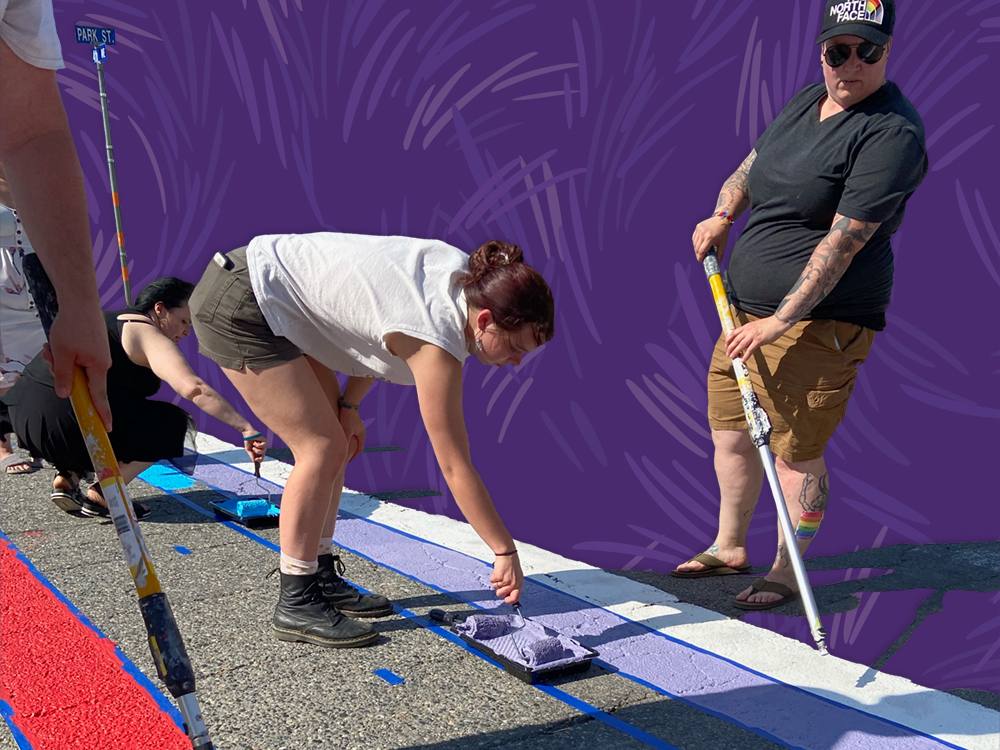The remoteness of Bella Bella, home to 1,400 people, makes it incredibly difficult to access many types of health and wellness services, including mental health care and therapy.
It’s not uncommon for people to fly to Vancouver, Campbell River or Nanaimo for everything from major surgery to orthodontic care. The only hospital on the island has fewer than 20 beds, and only one baby has been born on the island in the past 21 years.
Therapist Amélie Blanchard, who moved to the community in 2018 and left in 2021, says its size and the remoteness sometimes made it challenging to offer care.
Every time she left her house was an opportunity to run into either co-workers or clients, for example. Her boss lived across the road from her, and two of her co-workers lived a few doors down. The three of them would walk down the hill to work at the Hailika’as Heiltsuk Health Centre together.
Reputation is of utmost importance in a small town, and Blanchard was also concerned about her client base losing trust in her when she began dating an RCMP officer.
“For a while, I was making him park elsewhere,” she says. “If someone is parked in front of your house, you know they're visiting, so I was always like, ‘Go park somewhere else, especially the cop car.’ And then eventually everybody knew without even me telling them and they really liked him.”
Even discussing past clients now, Blanchard has some difficulty. She has to think carefully about her words, conscious that if she gives even general details about her clients, it could still make them easily identifiable. “I need to keep it very blurry,” she says.
The smallness of the community also made some types of care impossible. “It would have been really beneficial for some of the youth I was seeing in Bella Bella to do groups,” she says. “But because everybody knows each other, it’s really hard to maintain confidentiality.”
It’s a common cliché that queer folks must leave small towns in order to find community in the big city — but it’s also true that you can find LGBTQ2S+ people everywhere. In some cases, that’s because of a lack of mobility — there are very real financial and emotional barriers that can keep queer people in their hometowns.
For others, rural life has real draws. Juli Mallett, a community member on the board of Diverse and Inclusive Salt Spring Island, has a family history with farming and feels strongly in tune with the land.
“Your life starts to become aligned with the seasons and the land in a really responsive way, to where you're not really dictating the path of travel of your life,” says Mallett. “Things come up. A tree falls down, and you're dealing with that. There's something appealing in that just at a sort of basic personal level for me.”
The growing strength of queer presence in rural Canada has also led to a greater demand for specialized mental health care. Over six million Canadians live rurally, and the Canadian Mental Health Association states that LGBTQ2S+ youth face 14 times the risk of substance abuse and suicide, that queer people in general have higher rates of anxiety, depression and self-harm, and that queer adults have double the risk of post-traumatic stress disorder than the general population.
Affirming care can be difficult to find in urban environments even where it’s possible to drive across town or to another neighbourhood to meet with a specialist. In rural communities, that drive could turn into an hours-long trip.
Change and growing pains
Since Sunny Dyck, a roller derby coach and trained therapist, moved to Williams Lake in 1999, they’ve seen an enormous amount of positive transformation in the community.
Dyck, who is currently on leave from their position as a therapist but an active member of the Williams Lake Pride Society, says that acceptance of the LGBTQ2S+ community has grown tremendously. “When I moved up here, I had my backpack with a rainbow on it. It said, ‘I'm an ally.’ It was a gift that was given to me. People were like, ‘What’s that?’”
“It wasn't that the queer community didn't exist up here. It's always existed up here,” they say. But it wasn’t regularly acknowledged or necessarily visible.
Though visibility and understanding have since improved, barriers remain. For example, Dyck says, there are age limitations on who can access care.
The community has an outreach program for youth, Dyck says, that offers services for people up to 24. But it can be tougher to find accessible care for people 25 and up.
On Salt Spring, Mallett has assisted with creating protections for trans youth in high school. The principal of the school and many of the teachers have been incredibly accepting of their trans students, she says. But some teachers showed resistance to gendering their students correctly.
“[They said] this is a ‘luxury’ belief. This is something over and above what you can reasonably expect: for somebody to use your pronouns. To use your name,” Mallett says.
This bias is counter to research showing that using a trans teen’s chosen name is associated with lower rates of depression, suicidal ideation and suicidal behaviour.
A survey conducted by Trans PULSE Canada in 2021 reported that one in five trans and non-binary youth avoided schools due to fears of being harassed or outed. Additionally, according to the same survey, trans youth are more likely to be repeatedly misgendered by their primary care practitioner and are less likely to have their care needs met.
On Salt Spring, as in Bella Bella, residents have to travel to Vancouver or Victoria for more specialized care, according to Mallett.
“When people go off-island for care,” Mallett points out, “their support network doesn't come with them.”
A recent incident revolving around end-of-life care in the community brought this issue into sharp relief.
“We had a real pillar of our community die within the last year, and he was put into a bed to die in at the Jubilee,” Mallett says, referring to the Royal Jubilee Hospital in Victoria. “It was extremely difficult for his community to be there for him at a time when he was experiencing profound confusion.”
Inpatient psychiatric care can already be incredibly isolating, but the results are compounded when fewer people are able to visit. A meta-analysis published in the National Library of Medicine found a correlation between social support systems and mental health outcomes — and additionally that for queer folks and other minorities, social supports can be even more relevant than for the general population.
The benefits of small-town queer living
While cities can provide easier access to health care and wellness structures — and social supports such as events, clubs, parties and support groups — rural living has its benefits, too.
“You get to form intentional networks with people,” says Mallet. “Your relationships tend to be formed a little bit more person-to-person.”
The lack of a dedicated physical space, such as a gay bar or a permanent building for queer events, means that people in the community have to look out for each other more, Mallett says.
She adds that there is a possibility to form deep connections with people in her local community. “That is one of the charms of rural environments, and also one of the real difficulties. If you don't form those connections, it can feel really isolated.”
A greater deal of intimacy in the community also extends outside of the LGBTQ2S+ circles. Dealing with anti-LGBTQ2S+ individuals becomes very different when the populations are so small.
“We have a troll,” Dyck says, by way of example. “We love him.”
She elaborates: when a man who was against the pride society began to show up to events, her strategy was to kill him with kindness. She instructed the youth she worked with to treat him politely, and welcomed him into the event with open arms, offering him water or a cookie.
“We started treating him with nothing but love, and he’s no longer a troll,” she says.
Dealing with hate, and moving forward
Hope Pride Committee chair Megan te Boekhorst says that both anti- and pro-LGBTQ2S+ discourses manifest differently in rural areas. Hope recently experienced a spate of anti-LGBTQ2S+ vandalism in June, resulting in a defaced rainbow crosswalk and damaged storefront.
On the night of June 7, less than 24 hours after it had been painted, individuals vandalized Hope’s rainbow crosswalk with a hateful message containing a slur; in the early hours of June 8, teenagers shattered the window of Hope Community Services and burnt its office in an attempt to destroy pride flags inside.
Since Hope Community Services connects to many other businesses as part of a strip mall, te Boekhorst says the incident did “unbelievable damage and destruction affecting beyond the queer community.”
However, it was also teenagers that “primarily led the [cleanup] response.”
te Boekhorst didn’t even get a chance to see the damaged crosswalk in person; high school students had already fixed it before 11 a.m. the next morning.

She adds that educating current youth, future generations and medical professionals will help “change the narrative” for LGBTQ2S+ perceptions in rural communities. She hopes to compile tools for local service providers to help facilitate this change.
te Boekhorst thinks that teaching “early foundational” steps in a transgender patient’s social transitioning journey is the first goal for educating health professionals. Social transitioning is usually the first type of transitioning they encounter, with actions such as trying a new preferred name, preferred pronouns, and a preferred gender expression.
“I want at least some basics in terms of social transitioning supports in terms of understanding what a binder is, or what a packer is,” te Boekhorst says, referring to compression garments that give the appearance of a flatter chest and penis-shaped prosthetics, “Our medical teams don’t even know what a packer is.”
Mallett argues that structural changes in communities are tangible ways to make life safer for LGBTQ2S+ people and protect their mental health. One meaningful change that comes to mind for her is transitioning public bathrooms to being fully gender-neutral, with locking full-length stall doors.
In Williams Lake, Dyck is buoyed by the changes they’ve seen.
“It's a weird feeling that after years and years of fighting and education and advocacy, and being out there and showing that our town deserves better, and now we're getting better — literally getting better,” they say.
This series is made possible by the Jeani Read-Michael Mercer Scholarship for Journalism Students, an annual scholarship awarded to graduating students of the journalism program at Langara College in Vancouver, B.C. ![]()
Read more: Health, Rights + Justice, Gender + Sexuality

















Tyee Commenting Guidelines
Comments that violate guidelines risk being deleted, and violations may result in a temporary or permanent user ban. Maintain the spirit of good conversation to stay in the discussion and be patient with moderators. Comments are reviewed regularly but not in real time.
Do:
Do not: